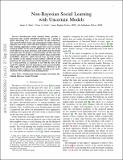Non-bayesian social learning with uncertain models
Author(s)
Hare, JZ; Uribe, CA; Kaplan, L; Jadbabaie, A
DownloadSubmitted version (7.080Mb)
Open Access Policy
Open Access Policy
Creative Commons Attribution-Noncommercial-Share Alike
Terms of use
Metadata
Show full item recordAbstract
© 1991-2012 IEEE. Non-Bayesian social learning theory provides a framework that models distributed inference for a group of agents interacting over a network. Agents iteratively form and communicate beliefs about an unknown state of the world with their neighbors using a learning rule. Existing approaches assume agents have access to precise statistical models (in the form of likelihoods) for the state of the world. However, in many situations, such models must be learned from finite data. We propose a social learning rule that takes into account uncertainty in the statistical models using second-order probabilities. Therefore, beliefs derived from uncertain models are sensitive to the amount of past evidence collected for each hypothesis. These beliefs characterize whether or not the hypotheses are consistent with the true state of the world. We explicitly show the dependency of the generated beliefs with respect to the amount of prior evidence. Furthermore, as the amount of prior evidence goes to infinity, learning occurs and is consistent with traditional social learning theory.
Date issued
2020-01-01Department
Massachusetts Institute of Technology. Institute for Data, Systems, and Society; Massachusetts Institute of Technology. Department of Civil and Environmental EngineeringJournal
IEEE Transactions on Signal Processing
Publisher
Institute of Electrical and Electronics Engineers (IEEE)
Citation
Hare, JZ, Uribe, CA, Kaplan, L and Jadbabaie, A. 2020. "Non-bayesian social learning with uncertain models." IEEE Transactions on Signal Processing, 68.
Version: Original manuscript